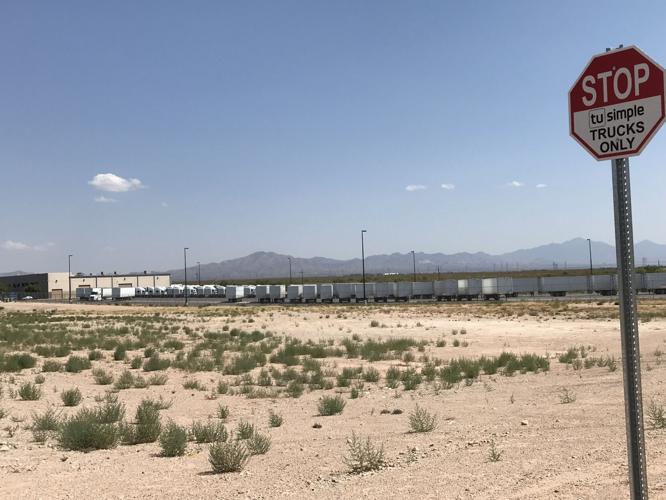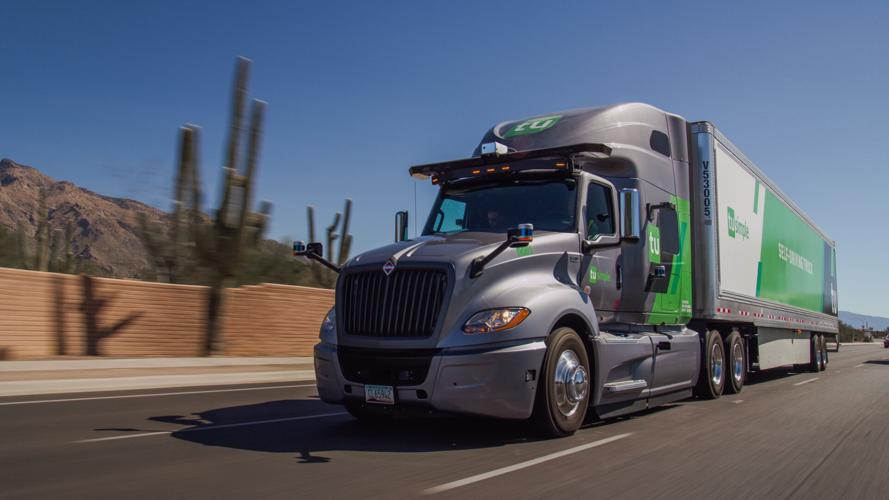Self-driving truck developer TuSimple is looking to sell off its U.S. operations, including a major research center and freight terminal in Tucson where it laid off most employees not long after a major expansion just last year.
And now, the city of Tucson is trying to claw back more than $100,000 in construction sales-tax breaks TuSimple got as incentive for constructing a new building and hiring more than 100 people as part of its short-lived expansion.
The publicly traded TuSimple Holdings said in a June 28 news release that it is “evaluating strategic alternatives for its U.S. business with a goal to maximize shareholder value.”

Idle trucks and trailers are lined up at TuSimple’s facility on East Old Vail Road in Tucson. The self-driving truck company is looking to sell off its U.S. operations after an executive management shuffle.
The San Diego-based company, which is already selling off many of its idle trucks and trailers, says it has engaged an investment banking firm as a financial advisor “to explore possible transactions for the U.S.-based portion of its business.”
TuSimple has laid off most of its U.S. employees in Tucson, San Diego and Fort Worth, Texas, after an executive shakeup last fall and a subsequent decision to drop its nascent autonomous freight network and instead seek a partner to commercialize its self-driving truck technology.
In a notice to the state under the federal Worker Adjustment and Retraining Act in May, TuSimple said it would lay off 108 workers at its location on East Vail Road, after laying off 135 workers in December as part of a prior restructuring.
The company said last fall that hiring since 2021 had grown its local workforce to about 300.
The WARN Act requires most employers of 100 or more workers to notify state authorities 60 days ahead of mass layoffs or plant closings.
TuSimple said the layoffs would drop its total U.S. workforce to 220 from 550 employees.
“We believe this is the right number of employees to work toward achieving our goals while preserving the cash on our balance sheet as well as retain strong publicly listed company capabilities,” the company said in a statement.
The company did not respond to the Star’s inquiries about the cuts.
Clawing back
Amid the mass layoffs, TuSimple is in apparent violation of a February 2021 incentive agreement based on job creation.
Under the city’s Primary Jobs Incentive program, TuSimple was reimbursed $110,247 for city construction sales taxes it paid, based on its capital investment of $8.5 million to construct a 35,000-square-foot building and creating 104 new jobs at an average annual salary of nearly $99,000, said Barbra Coffee, the city’s director of economic initiatives.
But under the agreement, the new jobs must be retained for five years from the effective date of the agreement, and if the conditions of the agreement are not met, TuSimple would be required to pay back the financial incentive, with interest, she said.
City officials are awaiting more information from TuSimple, Coffee said.
“The city is in regular communication with TuSimple and has requested a report from the company detailing the impact of their recent restructuring on the Tucson community,” she said.

TuSimple trucks moved freight from Tucson to Phoenix using fully autonomous, “driver out” trucks in test runs in 2021 and 2022.
Executive shuffle
Last November, about a month after a ribbon-cutting at its new Tucson digs featuring then-Gov. Doug Ducey, TuSimple co-founder and CEO Xiaodi Hou was fired by the company’s board and co-founder Mo Chen was removed as chairman, amid an investigation of TuSimple employees improperly working with a startup founded by Chen in June 2022 to develop hydrogen-powered, autonomous trucks.
In December, the company said it had decided to drop its “unprofitable” truck routes, and focus on providing industry partners with its self-driving truck technology.
TuSimple had an agreement with truckmaker Navistar to build autonomous driving technology into its trucks, but the companies ended that pact in December.
The company also was considering selling off its Asian operations, which include offices in Beijing, Shanghai, China and Japan, where it recently began testing its self-driving trucks.
In May, the company said it would lay off 30% of its global workforce, cutting mostly its U.S. operations in San Diego and Tucson, but it said it planned to set up an autonomous trucking route between Tucson and Phoenix by late 2024.
TuSimple had been carrying paid loads on trucks with its self-driving systems, monitored by human drivers aboard, since 2017 with shipping partners including UPS and the U.S. Postal Service.
The company opened a new truck terminal in the Fort Worth area last year and in March marked 10 million miles driven by its rigs for research, testing and freight loads.
In 2021 and 2022, the company demonstrated more than 500 miles of completely autonomous, “driver-out” test runs between Tucson and Phoenix in cooperation with transportation and law-enforcement agencies.
In June, TuSimple announced it had successfully completed China’s first fully autonomous semi-truck run on open public roads in the Shanghai area, without a human in the vehicle or human intervention.
Regulatory woes
But the company has run afoul of regulators over its links with China and its financial reporting.
The company has faced federal probes into possible violations of restrictions on sharing technology important to national security.
TuSimple’s initial major investors included an affiliate of Sina Corp., a major Chinese technology firm.
In February 2022, TuSimple said it signed a National Security Agreement with the U.S. government, agreeing to limit access to certain data and adopt a technology-control plan, and to drop a board member from a Chinese investor group, among other measures.
TuSimple also faces possible delisting of its shares on the Nasdaq Stock Market after failing to file its 2022 fourth quarter financial report with the U.S. Securities & Exchange Commission.
The company, which raised more than $1 billion in an initial public offering of stock in 2021, said its reporting was delayed because it had retained a new auditing firm.
TuSimple’s stock remains listed pending a decision on the company’s appeal of the delisting to Nasdaq.
The company in its most recent financial report posted a net loss of $220 million on revenues of $4.9 million for the first six months of 2022.
But the company doesn’t appear to be in any immediate danger of running out of cash, after reporting in an interim SEC filing in March that it still had about $1 billion of cash and short-term investments on hand.
Meanwhile, TuSimple’s stock, which once topped $60 per share in 2021, dropped to as low as 80 cents in May before rebounding to the $2 range recently.





